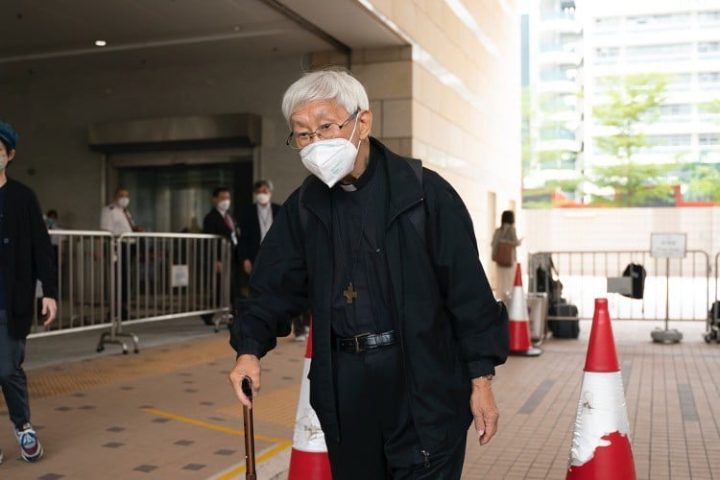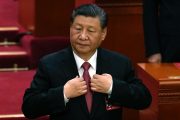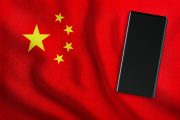
Hong Kong Cardinal Joseph Zen, 90, was charged with failing to register a now-defunct fund for pro-democracy protesters. As a result, he was fined HK$4,000 (US$512) last Friday by a local court.
Under newly imposed national security law in the city, Cardinal Zen and four others were arrested in May this year by the Hong Kong national security police for his alleged involvement with foreign actors. All pleaded not guilty.
The communist regime in Beijing implemented this national-security law in Hong Kong in 2020 to curb dissent. Put simply, this law criminalizes behavior or activities regarded as treason, secession, sedition, subversion, foreign interference, and terrorism. Furthermore, the law also indicates that the government in Beijing can establish agencies to meet the security needs of Hong Kong, if and when the regime regards it as expedient.
In response, various activists and national leaders have criticized this national security law as compromising freedoms promised to Hong Kong when it came under Chinese rule. Some even voiced concerns that articles in Hong Kong’s Basic Law that safeguard freedom of speech, freedom of worship, and freedom to assemble would be overlooked.
The cardinal’s arrest sparked backlash from some Western governments that perceived such actions as part of a campaign to crush dissent against the Chinese Communist Party.
Based on the prosecution’s arguments, the cardinal allegedly failed to file for local society registration for the now-disbanded 612 Humanitarian Fund between July 16, 2019, and October 31, 2021. The fund, for which Cardinal Zen assumed a leadership role, provided legal and monetary aid to protesters opposing a controversial 2019 bill that permitted extradition of Hong Kong residents to mainland China.
Prosecutor Anthony Chau argued that requiring registration of the fund did not undermine freedom of association, elaborating that the fund had spent most of the more than HK$450 million (US$57.6 million) in donations it received.
Defense lawyer Robert Pang represented Cardinal Zen, and asserted in court that the fund ought not to be deemed an association or society, stating that the defendants were not members of a society and had only helped run a fund.
The defense petitioned for the case to be dismissed, as the trustees had no rights and obligations to each other, thus they were not incorporated. Besides, the defense lawyers contested the constitutionality of the law on corporations, which they asserted “disproportionately” limited freedom of assembly.
“It’s the first time ever that anyone had to serve this charge under the society’s ordinance for failing to register,” said Ng, one of the defendants.
The group would require some time to discuss its next steps because freedom of association in Hong Kong remains “extremely important,” Ng added.
In her judgment, Principal Magistrate Ada Yim argued that the fund “had political objectives and thus it was not established solely for charitable purposes.”
Four other trustees of the fund, namely barrister Margaret Ng, scholar Hui Po-keung, politician Cyd Ho, and singer Denise Ho, were fined the same amount as the cardinal, while Sze Ching-wee, its secretary, was fined a lesser amount.
On Friday, Judge Yim ruled that the fund was a local society run like a trust fund and that committee members shared common political ideals and goals.
Cardinal Zen, a longtime champion of freedom and a staunch critic of the Chinese Communist Party, emphasized that the fund originally aimed to assist needy people.
“I’m just a Hong Kong citizen who strongly supports providing humanitarian assistance,” he told reporters after the verdict. “Although I’m a religious figure, I hope this [case] won’t be associated with our freedom of religion. It’s not related.”
Even after this most recent verdict, Hong Kong authorities could still persecute Cardinal Zen and the others, as police investigate a charge relating to “collusion with foreign forces.”
This court case has been regarded as a barometer of political freedom in Hong Kong during an ongoing communist crackdown on any opposition movements. Additionally, Cardinal Zen’s trial comes at a delicate time for the Vatican, which is embroiled with Beijing in a controversial deal over the appointment of bishops in China. The Vatican has expressed concern for Cardinal Zen’s well-being and safety, though it did not explicitly criticize the Hong Kong authorities.
Cardinal Zen has vehemently voiced objections to the 2018 deal between the Vatican and China over episcopal appointments. Earlier, both sides had insisted on having the final say on bishop appointments in mainland communist China, where religious activities are heavily surveilled and occasionally prohibited completely.
Born to Catholic parents in Shanghai in 1932, Cardinal Zen escaped to Hong Kong with his family to escape looming communist rule as a teenager. He was ordained as a priest in 1961 and made bishop of Hong Kong in 2002, before retiring in 2009. Regarded as the “conscience of Hong Kong” among his supporters, pro-freedom Cardinal Zen has appeared on the front lines of some of the city’s most significant protests, from the mass rally protesting national-security legislation in 2003 to the “Umbrella Movement” calling for universal suffrage in 2014.



